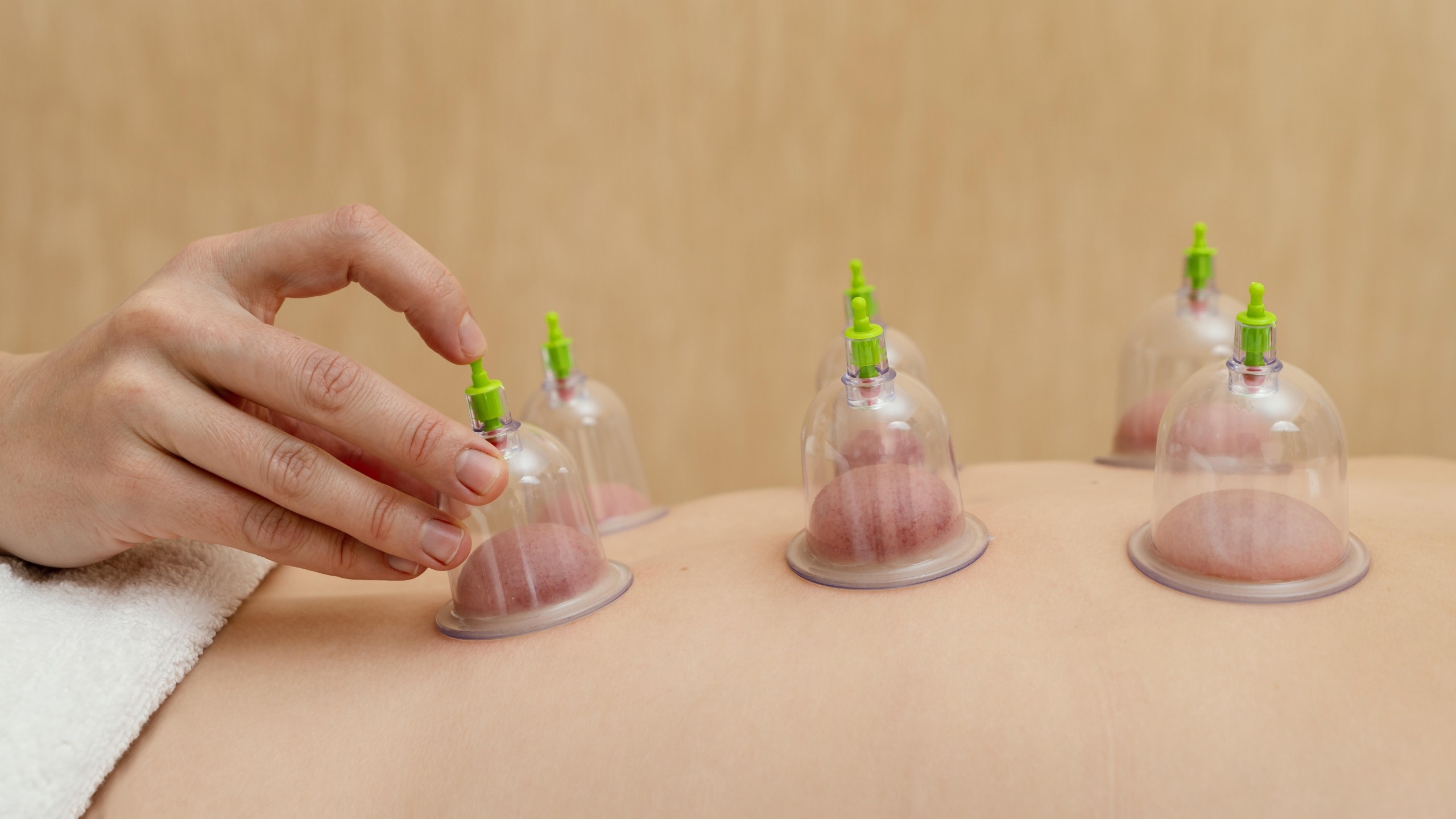Rejuvenate your body and soul with this ancient therapeutic practice
Cupping (Hijama), commonly known as cupping, is an ancient therapeutic practice that involves creating suction on the skin’s surface using glass or plastic cups. The cups are placed on specific areas of the body, and a vacuum is created by either heating the cups or using a suction pump. This process draws the skin upward into the cups, creating a localized suction.
Procedure:
⦁ Cup Placement:
Cups are strategically placed on specific points on the body, often corresponding to acupressure or acupuncture points.
⦁ Suction:
The cups create a vacuum, drawing the skin and superficial muscle layer into the cup. This may result in the skin appearing raised and reddened.
⦁ Duration:
The cups are left in place for a short duration, typically a few minutes.
⦁ Removal:
The cups are removed, and sometimes small incisions are made on the skin to release stagnant blood or toxins.
The benefits of Cupping (Hijama)
⦁ Pain Relief
⦁ Improved Blood Circulation
⦁ Improves the poor memory
⦁ Helps with the brain fog
⦁ Relaxation and Stress Reduction
⦁ Detoxification, skin purification
⦁ Digestive Issues
⦁ Chronic Fatigue Syndrome
Why do You Need Hijama?
Hijama, also known as cupping therapy, presents a range of potential benefits that have made it a sought-after traditional practice in various cultures. One key reason individuals seek hijama is for effective pain management, finding relief from ailments such as back pain, neck pain, and muscle soreness. The therapy’s ability to enhance blood circulation is another crucial factor, as improved circulation contributes to better oxygen and nutrient delivery to tissues, fostering overall health. Many individuals also turn to hijama for stress reduction and relaxation, appreciating the therapeutic release of muscle tension during sessions.
Beyond these physical benefits, hijama is believed to aid in detoxification by drawing toxins to the skin’s surface, facilitating the body’s natural cleansing processes. Additionally, its potential anti-inflammatory effects make it a consideration for those dealing with conditions marked by inflammation, such as arthritis. The therapy’s ability to support the body’s natural healing processes, making it relevant for individuals recovering from injuries or surgeries, further adds to its appeal.
In holistic health perspectives, hijama is seen as a means to balance the body’s energy and promote the flow of vital energy throughout the body, aligning with traditional medicine principles. While hijama has garnered popularity for its potential advantages, individuals should approach it cautiously and seek advice from healthcare professionals, particularly if they have existing health conditions. The decision to undergo hijama should be personalized, taking into account individual health needs and considerations.
Hijama /Cupping Is Not New
- Middle East: Hijama, recommended by Prophet Muhammad (saws), has been employed by Muslims for over a millennium.
- Egyptians: Cupping, documented as far back as 1550 B.C., was practiced by ancient Egyptians.
- Chinese: Cupping has been an integral part of traditional Chinese medicine for countless centuries.
- Native Americans: According to a conversation with an Osceola tribesman in Florida, bloodletting has traditionally been employed by their tribe for purification, involving small cuts on various body parts.
Why we should not be scared of Hijama (Cupping)
The thought of a blade touching and cutting your skin may sound a little scary and barbaric. Years ago, a friend suggested I try Hijama, but when I looked it up on Google and saw the pictures, I was taken aback. I was pretty sure I wouldn’t be able to bear the pain. Later on, I met a doctor who performs Hijama and explained the benefits. That encouraged me to give it a try.
The imaginations I had were completely shattered once I did it. There was no pain at all, and I regret not trying it sooner. The feeling afterward is like taking a cold shower in hot weather after exercise. You feel more awake, clear, and dynamic, with no foggy thoughts.
Try it out with our skilled doctor from Nizamiye Hospital and share your stories with us in the comment section.
Nizamiye Hospital, situated in Abuja, stands ever-prepared to provide its esteemed clientele with specialized treatment across a spectrum of health issues. Our dedicated team of medical professionals, boasting an extensive repertoire of over 24 specialized departments, ensures the successful, cost-effective, and efficient management of various healthcare concerns. Located at Plot 113, Sector S, Cadastral Zone, Life Camp, Abuja, Nigeria, we extend a warm invitation for your visit. For inquiries or appointments, feel free to call or text Veno from Public Relations at 08166666023 – 08056339444


Share this entry